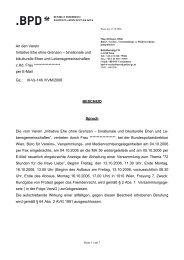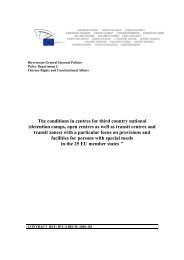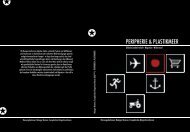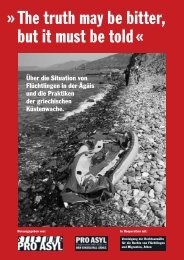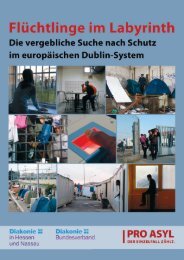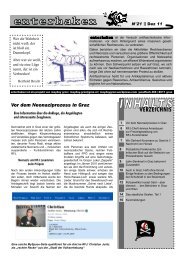Turin's CIE - International University College of Turin
Turin's CIE - International University College of Turin
Turin's CIE - International University College of Turin
You also want an ePaper? Increase the reach of your titles
YUMPU automatically turns print PDFs into web optimized ePapers that Google loves.
Nevertheless, it is also relevant to note that one detainee reported a completely opposite view <strong>of</strong><br />
the medical situation inside the <strong>CIE</strong>, though it is important to bear in mind that this particular<br />
detainee had never actually needed medical care inside <strong>CIE</strong>: “I think people are well-treated. If<br />
the person isn’t feeling well, they take them to the hospital” (Interview 24). A second detainee also<br />
expressed her satisfaction and relief for the way an illness she had when she entered the <strong>CIE</strong><br />
was proactively treated by the <strong>CIE</strong> medical staff.<br />
We would like to conclude this section with a final remark about the consequences that <strong>CIE</strong><br />
detention has on detainees’ physical health. A very common negative effect is drastic weight<br />
loss. Three detainees reported shocking weight losses <strong>of</strong> between fifteen to even twenty-five<br />
kilos: “When I left prison I was 72 kilos. [...] [Now] I cannot eat. [...] I have lost weight, now I’m 55<br />
kilos and I always have a stomach ache” (Interview 14). One detainee also reported about the<br />
worsening <strong>of</strong> his previous illnesses, in particular blood pressure, asthma and liver problems.<br />
3. RELATIONSHIPS WITH MEDICAL STAFF<br />
Relationships between detainees and medical staff are complex and multi-faceted, being<br />
diversely characterised by both positive and negative aspects. With respect to the latter, some<br />
detainees complained about a lack <strong>of</strong> communication: “Nobody tells me anything about my<br />
health. [...] I’ve always had a stomach ache. I was given an injection but after that they didn’t tell<br />
me anything” (Interview 14). Other detainees emphasised the general lack <strong>of</strong> interest on the part<br />
<strong>of</strong> <strong>CIE</strong> staff: six interviewees alleged that both Red Cross and medical personnel do not really<br />
care about detainees’ health conditions: “It would be enough for me to see that they do something<br />
when I complain about a toothache, instead <strong>of</strong> leaving me with my pain for half a day, just waiting”<br />
(Interview 18). As a matter <strong>of</strong> fact, an NGO worker commented: “A major problem that all<br />
detainees report, not only in <strong>Turin</strong>’s <strong>CIE</strong>, is a lack <strong>of</strong> attention to their medical care needs”<br />
(Interview 29).<br />
Several pr<strong>of</strong>essionals and volunteers highlighted strong concerns about the lack <strong>of</strong> mutual trust<br />
between doctors and detainees. Given the fiduciary relationship between a doctor and a patient,<br />
and the intrinsic importance <strong>of</strong> trust between them, this problem takes on added dimensions.<br />
An NGO worker’s seemingly accurate assessment <strong>of</strong> the situation noted that:<br />
“In all the centres we visited we noticed a reciprocal lack <strong>of</strong> trust between detainees and<br />
doctors. There is a guard-detainee relationship that overlaps with the doctor-patient<br />
relationship. But these are two different kinds <strong>of</strong> relationships, which should remain separate.<br />
And obviously the doctor-patient relationship, being the weakest one, suffers from this<br />
situation. It may happen that a doctor underestimates a problem because he is stuck in a<br />
“defensive” position. On the one hand doctors fear simulations, on the other hand detainees<br />
complain about this lack <strong>of</strong> attention towards their health problems” (Interview 29).<br />
Other interviewees focused on the potential risks stemming from the conflict between alleged<br />
fake simulations from detainees on the one hand and a lack <strong>of</strong> attention from medical staff on<br />
the other hand:<br />
“For example, there are detainees who are really ill and detainees who pretend to be ill just<br />
to be taken to the hospital in the hope <strong>of</strong> being released, and for the medical staff it is not<br />
easy to distinguish between these two cases. Sometimes they do not understand who is<br />
feeling really bad; they say he’s lying, he’s telling stories, while he might not be and this<br />
causes anger and frustration among detainees and staff as well” (Interview 2);<br />
46 | P a g e




